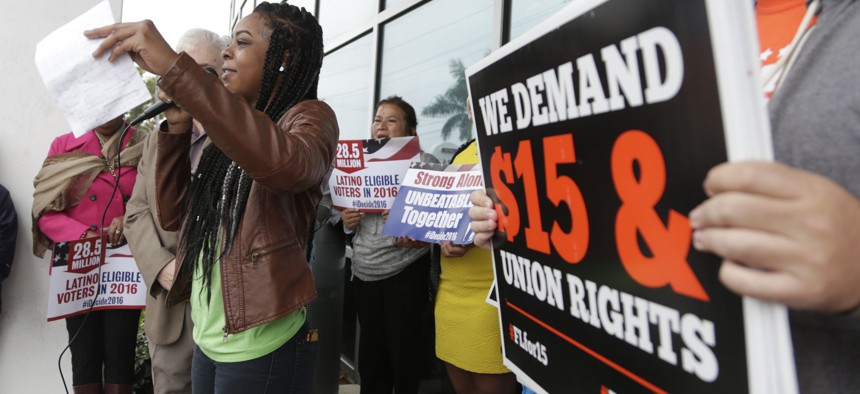A New Look at How States Block Local Laws in Areas Ranging From Guns to Taxes

Protestors in Florida call for a higher minimum wage and other legislation during 2016 in Florida. The state is one of about two dozen around the U.S. that have statutes restricting local minimum wage laws. (AP Photo/Lynne Sladky)
“This is a national preemption movement that is occurring,” says the CEO of the National League of Cities.
States around the U.S. have all sorts of laws on the books to block, or “preempt,” cities, towns and villages from enacting their own local policies on issues like the minimum wage, gun safety, rent control, plastic bag restrictions, and taxation.
This big-footing by state governments creates obstacles for communities seeking to tailor their own laws in these and other areas and is a source of frustration for many local elected leaders. It's also becoming increasingly common, with an uptick in the past five years or so, said Clarence Anthony, CEO of the National League of Cities.
“This is a national preemption movement that is occurring,” Anthony told Route Fifty on Thursday. “We’re seeing that it’s unprecedented.”
“Local control is under attack,” he added.
It’s against this backdrop that the National League of Cities recently partnered with Temple University on a project to analyze preemption in 12 different policy areas, in all 50 states.
This project culminated in an online tool, where it’s possible to select a state from a map of the U.S. and to then see details about how state laws preempt local ones in each place.
There’s a significant amount of detail for each state and policy area.
For example, the tool shows not only whether a state preempts local gun laws, but also which kinds of regulations are explicitly prohibited (such as those dealing with possession, sales, and concealed carry), and penalties officials can face for trying to regulate in these areas.
NLC says that some of the areas where preemption is the most common include gun laws, rent control and tax policy. The League also notes that there are at least nine states that lack mandatory paid sick leave, while also blocking local laws in this area.
Some of the other areas the project provides information for include: “ban-the-box” policies that restrict employers from asking about a person’s criminal history on job applications, property zoning, municipal broadband, and an array of tax limitations.
Spencer Wagner, a program specialist at NLC who worked on the project, identified two key factors he said are driving the rise in preemption that Anthony mentioned.
One, he said, is that businesses are spending more money to prevent what they often describe as a “patchwork” of local laws.
“We don’t really accept that argument,” Wagner said. “Every day businesses are working in different communities with different tax codes and health regulations.”
Another factor, he said, is the emergence of more “model legislation” from groups like the American Legislative Exchange Council, which can provide state lawmakers with ready templates for introducing bills that stymie local lawmaking.
Anthony flagged Arizona and his home state of Florida, where he served as mayor of South Bay for 24 years, as two states that have been especially aggressive on the preemption front.
“If someone comes into my home, I don’t expect they’re going to go there and tell me what kind of music I can play,” he said. “That’s in a sense how I feel about it. It’s the lack of respect that our local leaders are getting in terms of the policies that they need for their cities.”
The information on preemption from NLC and Temple can be found here.
Bill Lucia is a Senior Reporter for Route Fifty and is based in Olympia, Washington. You can reach him at wlucia@routefifty.com.
NEXT STORY: A Foster Care and Adoption Shift in a Southern State






